-
 Bitcoin
Bitcoin $117500
2.15% -
 Ethereum
Ethereum $3911
6.19% -
 XRP
XRP $3.316
10.79% -
 Tether USDt
Tether USDt $1.000
0.01% -
 BNB
BNB $787.2
2.24% -
 Solana
Solana $175.2
4.15% -
 USDC
USDC $0.9999
0.00% -
 Dogecoin
Dogecoin $0.2225
8.40% -
 TRON
TRON $0.3383
0.28% -
 Cardano
Cardano $0.7868
6.02% -
 Stellar
Stellar $0.4382
9.34% -
 Hyperliquid
Hyperliquid $40.92
7.56% -
 Sui
Sui $3.764
7.63% -
 Chainlink
Chainlink $18.48
10.66% -
 Bitcoin Cash
Bitcoin Cash $582.1
1.88% -
 Hedera
Hedera $0.2601
6.30% -
 Avalanche
Avalanche $23.33
4.94% -
 Ethena USDe
Ethena USDe $1.001
0.02% -
 Litecoin
Litecoin $122.3
2.04% -
 UNUS SED LEO
UNUS SED LEO $8.969
-0.27% -
 Toncoin
Toncoin $3.339
0.86% -
 Shiba Inu
Shiba Inu $0.00001287
4.30% -
 Uniswap
Uniswap $10.43
7.38% -
 Polkadot
Polkadot $3.861
5.08% -
 Dai
Dai $1.000
0.02% -
 Bitget Token
Bitget Token $4.513
3.41% -
 Monero
Monero $267.7
-6.18% -
 Cronos
Cronos $0.1499
4.14% -
 Pepe
Pepe $0.00001110
5.15% -
 Aave
Aave $284.9
8.28%
How to withdraw the income from mining?
Securely withdrawing mined crypto requires understanding your mining setup (solo, pool, cloud), choosing appropriate withdrawal methods (direct to wallet or exchange), and prioritizing security (2FA). Meticulous record-keeping is crucial for tax compliance.
Mar 02, 2025 at 04:36 am
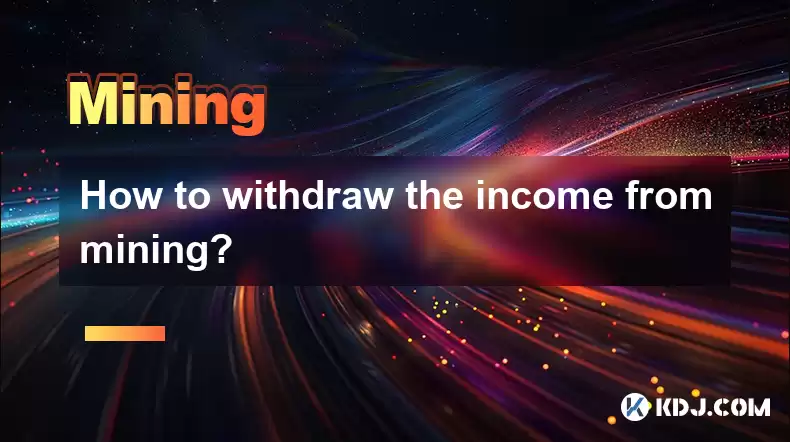
Key Points:
- Understanding the type of mining and its associated payout methods.
- Choosing a suitable withdrawal method based on your mining setup and exchange preferences.
- Navigating the withdrawal process on different mining pools and exchanges.
- Security considerations during the withdrawal process, including two-factor authentication.
- Tax implications of cryptocurrency mining income and the importance of record-keeping.
How to Withdraw the Income from Mining?
Cryptocurrency mining, while potentially lucrative, requires a clear understanding of how to access your hard-earned digital assets. The withdrawal process differs depending on several factors, primarily the type of mining operation and your chosen platform. Let's break down the key aspects.
First, you need to identify your mining setup. Are you solo mining, participating in a mining pool, or using cloud mining services? Solo mining involves directly receiving rewards to your personal wallet. Pool mining distributes rewards based on your contribution to the pool's hashing power, often paid out to your pool account. Cloud mining services usually handle payouts through their platform.
Next, consider your cryptocurrency. Different coins have varying minimum withdrawal amounts and transaction fees. Bitcoin, for example, might have higher fees than smaller altcoins. Understanding these fees is crucial to avoid losing a significant portion of your earnings. Check your pool's or exchange's fee structure before initiating a withdrawal.
If you're mining through a pool, the withdrawal process usually involves accessing your pool account dashboard. You'll find a section dedicated to withdrawals, where you'll need to provide your cryptocurrency wallet address. Double-check the accuracy of this address; sending funds to the wrong address can result in irreversible loss. Many pools have a minimum payout threshold, so you'll need to accumulate enough mined cryptocurrency before you can withdraw.
Exchanges, where you might trade your mined cryptocurrency, also have withdrawal processes. These typically involve navigating to your account settings, selecting the cryptocurrency you wish to withdraw, and entering the destination wallet address. Again, double-check this address carefully. Exchanges may impose daily or weekly withdrawal limits, and they often have associated fees. Understanding these limits is crucial for planning your withdrawals.
Security is paramount when withdrawing mining income. Enable two-factor authentication (2FA) wherever possible, as this adds an extra layer of protection against unauthorized access. Be wary of phishing scams, which attempt to trick you into revealing your login credentials or wallet details. Never share your private keys or seed phrases with anyone.
Tax implications vary by jurisdiction. It's crucial to understand your local tax laws concerning cryptocurrency mining income. Maintain meticulous records of your mining activities, including earnings, expenses, and transactions. Consulting a tax professional specializing in cryptocurrency is highly recommended.
Understanding different mining scenarios:
- Solo Mining: Rewards are sent directly to your wallet. The withdrawal process is simply managing your personal wallet.
- Mining Pool: Rewards are distributed proportionally based on your contribution. You withdraw from your pool account to your personal wallet.
- Cloud Mining: Payouts are managed by the cloud mining provider; the withdrawal method is specific to their platform.
Choosing a Withdrawal Method:
- Direct to Wallet: This involves sending the cryptocurrency directly to your personal wallet.
- Exchange Transfer: This involves transferring the cryptocurrency to an exchange for trading or further transactions.
Security Best Practices:
- Use Strong Passwords: Employ unique and complex passwords for all your accounts.
- Enable 2FA: Add this extra layer of security to prevent unauthorized access.
- Regularly Update Software: Keep your mining software and wallet software up to date to patch security vulnerabilities.
- Use Hardware Wallets: Consider using a hardware wallet for added security, especially for storing larger amounts of cryptocurrency.
Common Questions:
Q: What is the minimum withdrawal amount for mining pools? A: This varies greatly depending on the mining pool and the cryptocurrency being mined. Check your specific pool's terms and conditions.
Q: How long does a withdrawal take? A: Withdrawal times vary, depending on the network congestion of the cryptocurrency. Some transactions can be almost instantaneous, while others may take several hours or even days.
Q: Are there fees associated with withdrawals? A: Yes, most pools and exchanges charge fees for withdrawals. These fees can be fixed or percentage-based. Be sure to factor these fees into your profitability calculations.
Q: What if I send my cryptocurrency to the wrong address? A: Sending cryptocurrency to the wrong address is usually irreversible. Contact the pool or exchange support immediately, but the chances of recovery are slim.
Q: How do I report my mining income for taxes? A: Tax regulations regarding cryptocurrency vary widely by jurisdiction. Consult a tax professional for personalized advice based on your location and circumstances. Keep meticulous records of all your mining activity.
Q: Can I withdraw a portion of my mining income? A: Yes, most mining pools and exchanges allow partial withdrawals, provided you meet the minimum withdrawal amount. However, frequent small withdrawals might incur higher fees overall.
Disclaimer:info@kdj.com
The information provided is not trading advice. kdj.com does not assume any responsibility for any investments made based on the information provided in this article. Cryptocurrencies are highly volatile and it is highly recommended that you invest with caution after thorough research!
If you believe that the content used on this website infringes your copyright, please contact us immediately (info@kdj.com) and we will delete it promptly.
- FTT Token's Wild Ride: Creditor Repayments vs. Market Drop - A New Yorker's Take
- 2025-08-08 07:10:12
- Floki Crypto Price Prediction: Riding the Robinhood Rocket or Just a Meme?
- 2025-08-08 07:15:12
- EigenLayer, Restaking, and Ethereum: Navigating the Hype and the Hazards
- 2025-08-08 06:30:12
- Super Bowl 59: Jon Batiste to Jazz Up the National Anthem
- 2025-08-08 06:30:12
- Cold Wallet Crypto in 2025: The Future is Now, Ya'll
- 2025-08-08 05:10:13
- MAGACOIN, SOL, and ADA: A Tale of Shifting Tides in Crypto
- 2025-08-08 05:10:13
Related knowledge
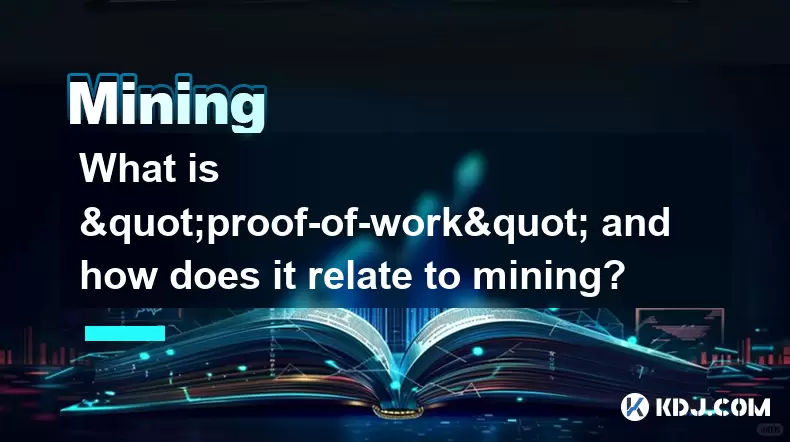
What is "proof-of-work" and how does it relate to mining?
Aug 07,2025 at 02:03pm
Understanding the Concept of Proof-of-WorkProof-of-work (PoW) is a consensus mechanism used in blockchain networks to validate transactions and secure...
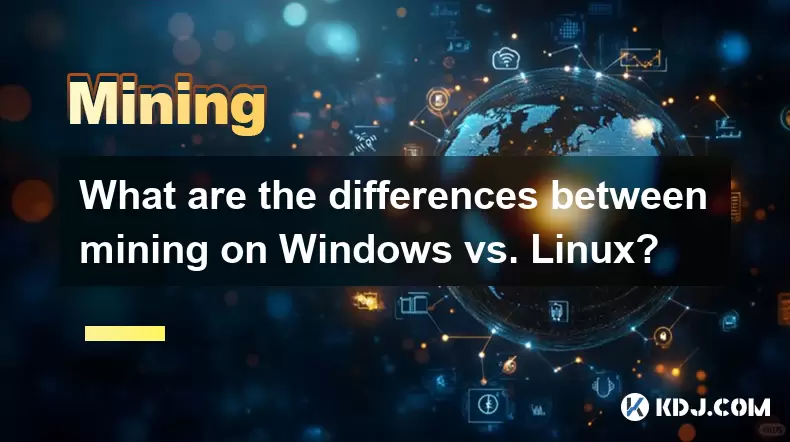
What are the differences between mining on Windows vs. Linux?
Aug 06,2025 at 11:29pm
Overview of Cryptocurrency Mining PlatformsCryptocurrency mining involves using computational power to solve complex cryptographic puzzles and validat...
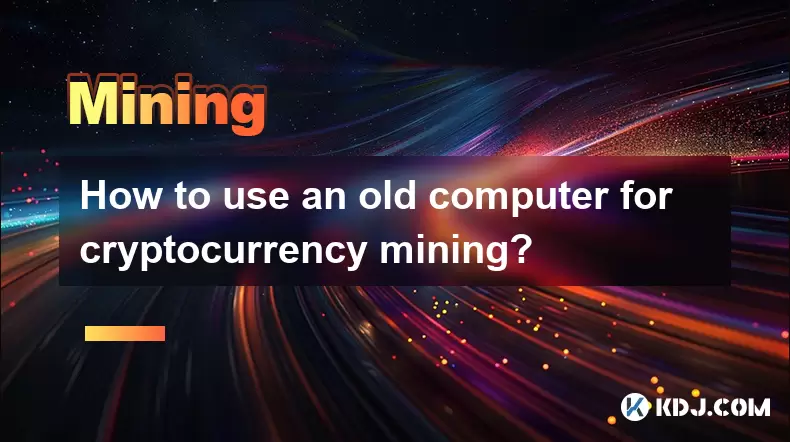
How to use an old computer for cryptocurrency mining?
Aug 07,2025 at 12:42pm
Understanding the Feasibility of Using an Old Computer for MiningUsing an old computer for cryptocurrency mining may seem outdated, but it is still te...
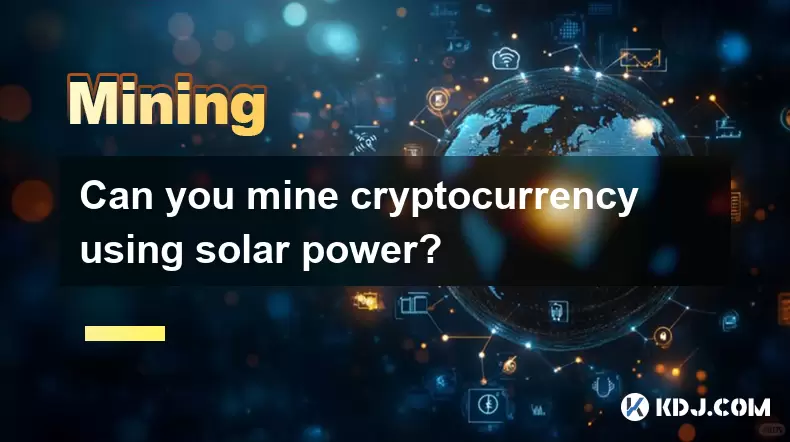
Can you mine cryptocurrency using solar power?
Aug 07,2025 at 12:00am
Understanding the Basics of Cryptocurrency MiningCryptocurrency mining involves validating transactions on a blockchain network by solving complex cry...
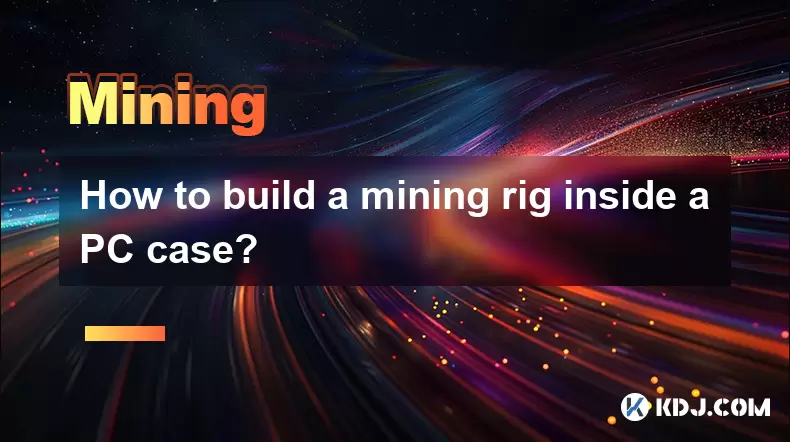
How to build a mining rig inside a PC case?
Aug 06,2025 at 11:01pm
Understanding the Basics of a Mining Rig in a PC CaseBuilding a mining rig inside a PC case involves transforming a standard computer chassis into a d...

What are the best cryptocurrencies to mine with an ASIC?
Aug 08,2025 at 01:22am
Understanding ASIC Mining and Its Role in CryptocurrencyASIC stands for Application-Specific Integrated Circuit, a specialized hardware designed to pe...

What is "proof-of-work" and how does it relate to mining?
Aug 07,2025 at 02:03pm
Understanding the Concept of Proof-of-WorkProof-of-work (PoW) is a consensus mechanism used in blockchain networks to validate transactions and secure...

What are the differences between mining on Windows vs. Linux?
Aug 06,2025 at 11:29pm
Overview of Cryptocurrency Mining PlatformsCryptocurrency mining involves using computational power to solve complex cryptographic puzzles and validat...

How to use an old computer for cryptocurrency mining?
Aug 07,2025 at 12:42pm
Understanding the Feasibility of Using an Old Computer for MiningUsing an old computer for cryptocurrency mining may seem outdated, but it is still te...

Can you mine cryptocurrency using solar power?
Aug 07,2025 at 12:00am
Understanding the Basics of Cryptocurrency MiningCryptocurrency mining involves validating transactions on a blockchain network by solving complex cry...

How to build a mining rig inside a PC case?
Aug 06,2025 at 11:01pm
Understanding the Basics of a Mining Rig in a PC CaseBuilding a mining rig inside a PC case involves transforming a standard computer chassis into a d...

What are the best cryptocurrencies to mine with an ASIC?
Aug 08,2025 at 01:22am
Understanding ASIC Mining and Its Role in CryptocurrencyASIC stands for Application-Specific Integrated Circuit, a specialized hardware designed to pe...
See all articles

























































































